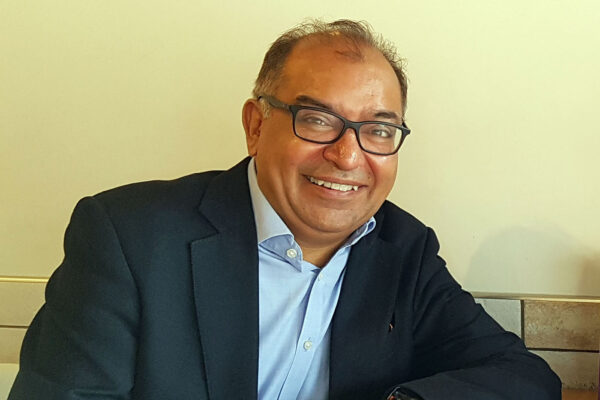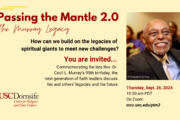This radio documentary was originally produced by KALW’s The Spiritual Edge, with the support of CRCC’s global project on engaged spirituality.
To hear this and other profiles, subscribe to The Spiritual Edge podcast in your favorite podcasting app, including Apple podcasts, Spotify or Google Podcasts. Find out more on The Spiritual Edge website.
I’m sitting in a small, cosy cafe in a quiet part of West London on a cold, wet, typically English Monday morning.
The other shops near here — the generic franchises, faceless drive-thrus and big stores — blend into the background. But the cafe I’m in stands out. Starting with its name – Ahimsa.
“Ahimsa means non-violence in Sanskrit, the inspiration behind opening this café”, Ratchri, one of the managers who runs the cafe tells me.
“It’s a very big part of the Jain religion, Ahimsa. We’re basically here to eliminate animal suffering and also Ahimsa means non-violence in thought, word and action, so everyone is welcome. We do get a lot of Jain people coming here,” she adds.
Like Ratchri tells me, protection for all forms of life, from the largest mammals to the smallest bacteria is at the heart of Jainism’s ethos. And so everything on the menu at the Ahimsa cafe is 100% vegan – no meat, dairy or animal produce at all.
Compared to other faiths, Jains are small in number — the last census in 2011 estimated the number in the UK to be around 20,000, though community leaders believe the actual figure is almost three times as many. More on that later.
I’m at this cafe to meet one of the most prominent Jains in the UK: Mehool Sanghrajka. He was made an MBE — a Member of the British Empire — by the UK government and Queen.
It’s an honor given to recognize outstanding contribution made to civic life. In Mehool’s case, it’s for his public service as a Jain and his work in education.
I’m also here to enjoy breakfast.
“We’ve got scrambled tofu, sausages, beans, spinach, tomatoes, mushrooms and toast. This is a full English breakfast except it’s 100% vegan,” Mehool says, telling me he comes to the cafe on a weekly basis.
Mehool is as British as this, even as his background placed him in distant regions of the Commonwealth.
“I’m Gujrati Indian. In terms of heritage by birth, I’m an African. I was born in Kenya and I’ve lived almost 50 years in the UK. So I understand all of those identities. I recognize all of those.”
Along with his leadership in the Jain community, Mehool’s also the CEO of a social enterprise that focuses on improving the life chances for children through digital technology.
Technology expands humans’ reach and that’s why Mehool has decided to pursue it. He believes education is the best way to get people out of poverty. That may be an end, but the means are tied to his faith.
Mehool is the kind of guy who gets involved in lots of different things. But at the root of his motivations are his Jain community and a desire to help people rise above their circumstances.
“It gives me identity. It gives me a sense of purpose, a sense of being, but also a sense of who I am, because it largely defines, you know, my vision of right and wrong. What I see the purpose of this life as being and also it’s gone on to define my work and my attitude towards both my community and the people around me,” Mehool says.
“I mean, you know, it doesn’t matter what profession I’m in. I mean, it doesn’t matter where I live. Those things will change. But this identity, you know, it’s something I’ve grown up with and it’s never going to change.”
Jainism isn’t listed in the UK census alongside other major world faiths as there isn’t considered to be a large enough community in the UK. So there’s no formal recognition for this ancient religion which underpins everything Mehool does.
It means there’s no way to know exactly how many Jains there are in the UK or the size of the community. The UK census takes place every 10 years.
“I think the census is therefore, you know, clearly lagging behind, clearly not doing what it needs to. And I think it’s a matter of time. I think it’s put us at the forefront of the debate. You know, the government knows who we are. The Office of National Statistics knows who we are. It’s been in parliament.
I think the contradiction, the impact of the contradiction for us, though, is very profound. And part of the reason is if you look at who else is in the ‘other’ section, it is those who don’t believe in any faith and so on. So it’s never taken seriously. So, you know, we are the largest religion in the ‘other’ section, but we’re ignored because we’re not in the main section. And therefore, you know, it has a huge consequence which takes years to correct because the census only comes around every 10 years.”
Mehool has been actively campaigning to get Jainism added to the list of recognized religions.
“Jainism is so much about an attitude and a way of life and an identity that you’re proud of. Now, most Jains historically have shied away from saying that they’re Jain simply because the next question is, who are they?
And so they now need to have some understanding of Jain history and which most of them, you know, perhaps don’t. So they’ve shied away from that. And what we want to do by putting it on the census is basically, you know, make it something people wear with pride.”
Mehool and I met for breakfast before the coronavirus pandemic hit. COVID-19 has added a degree of difficulty to the many priorities Mehool has had to juggle.
Maintaining the ability for Jains in the UK to practice their faith during the pandemic — at home and as a community — became one of Mehool’s major goals.
When they couldn’t perform religious rites and rituals in person like they usually would, Mehool and his wife Arshana helped the community concentrate on what’s within their control and what isn’t.
Mehool’s helped to foster this through organising lectures, prayer sessions and even yoga classes like this one over Zoom, ensuring his small, close-knit community — many of whom are elderly — aren’t left isolated.
“So, one thing is to spend time effectively, reading, contemplating, meditation and so on. Now that you’re stuck in one place using technology, visiting temples remotely in India is possible, listening to sermons is possible, looking at prayer that’s going on in other places is possible and so, I think it’s actually opened the horizons and you know, made this far more meaningful,” Mehool says.
And his wife Arshana agrees.
“I think it’s also brought a lot of people together because realistically when you’re in prayer in a temple on your own, it is a solitary practice, whereas now people are actually inviting a whole Zoom community into their home whilst they’re in prayer.
So for example, where you’d go to a temple and actually do temple worship, rituals like anointing the statue on your own, you now have one person in their home doing it and an entire Zoom community linked in watching. Religion and ritual became much more accessible.”
 Click here to listen on thespiritualedge.org.
Click here to listen on thespiritualedge.org.
Athar Ahmad is a journalist fellow with the Spiritual Exemplars Project.







